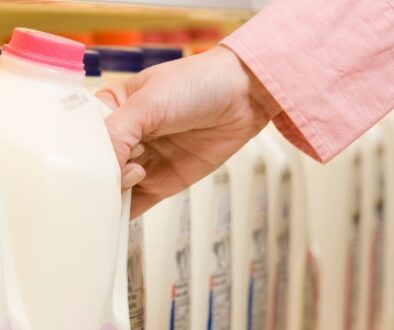Taking Action on Dairy Limits At Retail
April 14, 2020, Madison, Wis. — Dairy Farmers of Wisconsin (DFW) and the Wisconsin Department of Agriculture, Trade and Consumer Protection (DATCP) have been fielding calls from concerned consumers and farmers about retailers limiting the amount of dairy that shoppers can purchase. The two organizations have been working diligently to contact retailers in Wisconsin to understand why, to urge them to lift the limits, and to continue to drive consumer demand for dairy.
The good news is that DFW and DATCP can confirm many stores already have and are lifting limits. Both organizations have been reaching out to retailers to explain to them the importance of ceasing limits due to the impact it has on dairy farmers. As of today, they have confirmed that Festival, Pick ‘n Save and Target stores across the country have removed all limits and that Kwik Trip and Metcalfe’s never had them.
“We all want to keep Wisconsin’s milk moving from the farm to consumers,” said DATCP Interim Secretary Randy Romanski. “That’s why DATCP appreciates the partnership of Dairy Farmers of Wisconsin as we all work to support our state’s dairy farmers and help find ways to keep the food supply chain moving.”
Limiting Milk and Dairy
Due to the volume of inquiries they are receiving regarding stores across the Midwest limiting milk and dairy, DFW and DATCP have set up an online form, Wisconsindairy.org/StopLimits, for farmers and consumers to report any retail limits they see. In addition, DFW has reallocated staff to deal with the inquiries and reach out to the retailers.
A key partner in this effort is the Wisconsin Grocers Association (WGA). The two organizations have worked with WGA’s President and CEO Brandon Scholz to urge retailers across the state to remove limits on dairy through its newsletter updates. Additionally, in an effort to drive dairy sales, earlier this week, DFW went a step further and created signs for retailers to post encouraging consumers to support local dairy farmers. They’ve also been heavily promoting milk and dairy advertising on television and via social with their “Here For You” campaign.
“Dairy Farmers of Wisconsin and DATCP are deeply engaged with the grocery network and supply chain across the state,” said Chad Vincent, Dairy Farmers of Wisconsin CEO. “While we can’t lobby or influence the price of milk and dairy sold, we serve as the voice of farmers and have heard their requests. As a result, we have been on the phone asking individual retailers to lift purchasing limits for dairy.”
The two most asked questions from farmers and consumers are “why are there limits?” and “what can I do if I see limits?” DFW and DATCP address the questions with the following:
The dairy industry, in Wisconsin and beyond, continues to work along the supply chain to ensure that stores have milk and dairy products for consumers. There are three factors in the supply-chain that retailers must work with to get the product on the shelf:
- Processing and storage capacity – processing plants can only produce a certain amount of product over time based on their plant layout and production lines. If there are back-ups in production, due to the reduced workforce or line capacity limits, it can create a bottleneck. Fresh milk is perishable and must be processed quickly due to a short shelf-life. The product that can be held for a longer period of time such as cheese, powders, and shelf-stable milk can last longer in storage which can alleviate the bottleneck.
- Availability of trucks – there is the same number of truck drivers, but increased demand for products and reduced over the road services. This is placing a strain on truck drivers which can result in slower than expected refill rates.
- Product supply for everyone – Milk is in 94% of households and dairy is in 99%. Thus, retailers need to make sure milk and other dairy products are available at all times. If shoppers buy 5-10 gallons on a weekend, it’s difficult to restock those shelves quickly which in turn means someone who only shops during the weekday may not be able to have a gallon of milk for the week.
Source: Wisconsin Dairy




